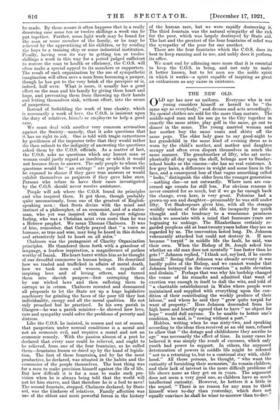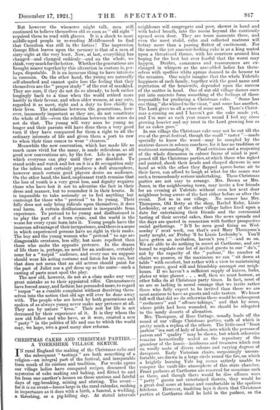THE NEW OLD.
OLD age has now no uniform. Everyone who is not young considers himself or herself to be " the same age as everybody," and dresses and acts accordingly. No special clothes are sold for the more than mature. The middle-aged man and his son go to the City together in exactly the same attire, play golf in the same, go out to dinner in the same. The young married woman and her mother buy the same coats and skirts off the same pegs. The elder lady goes to say good-night to her grandchild in the same kind of evening dress as is worn by the child's mother, and mother and daughter occupy and often even disport themselves in much the same manner. The grandmother of fifty, who sat meta- phorically all day upon the shelf, belongs now to Sunday- school books or the cinema—she has no real existence. A few grey hairs, a difference in weight and some lines in the face, and a consequent loss of that vague something called " looks," distinguish the older from the younger generation —nothing else—or not outwardly. Where men are con- cerned age counts for still less. For obvious reasons it never counted for so much, but if we go far enough back the change, even here, is very great. Polonius had a grown-up son and daughter—presumably he was still.under fifty. Yet Shakespeare gives him, with all the strange worldly wisdom of the able old, the incapacity for quick thought and the tendency to a wearisome prosiness which we associate with a mind that fourscore years are beginning to unhinge. The Elizabethans certainly re- garded people as old at least twenty years before they are so regarded by us. The convention lasted long. Dr. Johnson vehemently attacked but could not destroy it. If men became " torpid " in middle life the fault, he said, was their own. When the Bishop of St. Asaph asked him whether an old man does not mentally " lose faster than he gets I " Johnson replied, " I think not, my lord, if he exerts himself " Seeing that Johnson was already seventy it was hardly polite of the Bishop, and we cannot wonder that Johnson betrayed in the conversation " a noble elevation and disdain." Perhaps that was why his lordship changed the venue of his remarks and admitted that want of exertion was enough in itself to dull the wits, and told of " a charitable establishment in Wales where people were maintained and supplied with everything upon the con- dition of their contributing the weekly produce of their labour," and where he said they " grew quite torpid for want of property." Here Johnson descended from his high horse and heartily agreed that to have " no object for hope " would dull anyone. To be unable to better one's condition, he said, is rowing without a port." Hobbes, writing when he was sixty-two, and speaking according to the ideas then received as an old man, refused to allow that " the dotage and childishness they ascribe to age" was necessarily the effect of time. In many cases he believed it was simply the result of excesses, which only youth had power to support. In others, the supposed deterioration of powers in middle life might be referred " not to a returning to, but to a continual stay with, child- hood." All those persons, he thought, " who want the curiosity of furnishing their memories," do remain children, and their lack of interest in the more difficult problems of life shows more as they get on in years. The argument does not seem a very good one, as children have so much intellectual curiosity. However, he betters it a little in the sequel. " There is no reason for any man to think himself wiser to-day than yesterday, which does not equally convince he shall be wiser to-morrow than to-day." But however the wiseacres might talk, men still continued to believe themselves old so soon as " old sight " required them to read with glasses. It is a shock to most middle-aged people in re-reading Middlemarch to find that Casaubon was still in the forties ! The impression George Eliot leaves upon the memory is that of a man of sixty-eight at the very least. Now, at last, everything has changed—and changed suddenly—and on the whole, we think, very much for the better. Whether the generations arc Brought nearer together by this alteration in custom is, per- haps, disputable. It is an immense thing to have interests in common. On the other hand, the young are naturally self-absorbed and cannot quite lose the feeling that they themselves are the " proper study " of the rest of mankind. They are sure, if they do not do so already, to look rather longingly back to a time when the world retired more hastily in their favour, and when older women, at any rate, regarded it as meet, right and a duty to live chiefly in their lives. The relations between the generations, how- ever, immensely important as they are, do not constitute the whole of life—even the relations between the sexes do not do that. The young will very soon be young no longer and their parents will have done them a very good turn if they have conquered for them a right to all the ordinary interests of life and given them a port to row to when their time comes to wear " clearers."
Meanwhile the new convention, which has made life so much more vivid for the many, is made ridiculous, as all good new conventions are, by the few. Life is a game at which everyone can play until they are disabled. To stand aside and watch and bet on it is a fit occupation only for the infirm and certainly produces a dull atmosphere, however much certain good players desire an audience. On the other hand, the hard, unpleasant truth remains that the loss of youth is a very great loss, and dignity requires those who have lost it not to advertise the fact in their dress and manner, but to remember it in their hearts. It is impossible to take seriously or to feel anything but contempt for those who " pretend " to be young. Their folly does not only bring ridicule upon themselves, it does real harm. A certain disillusionment is inseparable from experience. To pretend to be young and disillusioned is to play the part of a born cynic, and the world is the worse for every cynic born into it. Young people have the immense adVantage of their inexperience, and there is a sense in which experienced persons have nocright in their ranks. The boy and the young woman who " pretend " to age are ' disagreeable creatures, less silly, but more repellent than those who make the opposite pretence. In the drama of life there is, perhaps, no need for an audience, certainly none for a " torpid " audience, and every one we suppose should wear his acting costume and listen for his cue, but that does not mean that an old actress should paint for the part of Juliet nor a girl dress up as the nurse—such a casting of parts must spoil the play. The new old, however, do not as a class make any very great mistake as to their appointed roles. Circumstances have forced many, and fashion has persuaded more, to regard " torpor " as a curable complaint without deceiving them- selves into the notion that old age will ever be done away with. The people who are loved by both generations and spoken of as always young never make any pretence at all. They are by nature " keen." Their zest for life is not decreased by their experience of it. It is they whom the new old follow and who have, as it were, created a new " party " in the politics of life and one to which the world may, we hope, owe a good many slow reforms.







































 Previous page
Previous page